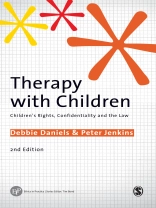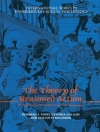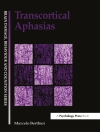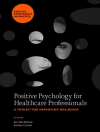Therapy with Children is a vital resource for any practitioner navigating the legal minefield of working with children and young people. Prioritising the needs of the child as the client, the authors explore the legal and professional dimensions of working therapeutically with children.
This long-awaited second edition responds to significant shifts in policy and the revised text additionally addresses:
– the importance of confidentiality in establishing a working alliance and maintaining a secure environment for therapy with children
– the conflicting pressures faced by therapists concerning issues of parental involvement and children at risk
– changes in light of the Children Act 2004, Mental Health Act 2007, and the Axon case
– changes in the organisation of child protection
– increased provision of therapeutic services for children, particularly in school settings, and the growing numbers of counsellors working with children
– the relevance of psychoanalysis in development of child-focused therapy, as well as reference to other therapeutic approaches to child therapy
– the urgent case for developing ′confidential spaces′ within therapeutic services for children and young people.
Illustrated with vivid case examples, Therapy with Children provides stimulating reading and is an excellent source of reference for all psychotherapists and counsellors working with children. The issues here will also be of direct relevance to youth workers, teachers, social workers and health professionals.
สารบัญ
PART ONE: THEORETICAL FRAMEWORKS
Children′s Rights: From Dependence to Autonomy
Therapy with Children: The Psychoanalytic Tradition
Therapy and the Rights of the Child
The Law Relating to Therapy with Children: Contrasting Approaches
PART TWO: CASE EXAMPLES
Parental Oversight of Therapy: The Therapist as Mediator
Reporting Child Abuse: The Therapist as Law Enforcer
Provisional Confidentiality in Practice: The Therapist as Protector
Working with Risk: The Therapist as Enabler
PART THREE: THERAPY WITH CHILDREN: SOME CONCLUSIONS
Empowering Children: The Case for Therapy as a ′Confidential Space′
Appendix 1: Summary of the United Nations Convention on the Rights of the Child (CRC) 1989
Appendix 2: Resources
เกี่ยวกับผู้แต่ง
Peter Jenkins is a counsellor, trainer, supervisor and researcher. He has worked as a student and staff counsellor in college and university settings for the past thirty years. During this time, he has developed a particular interest in exploring ethical, professional and legal issues in counselling practice. He has run over two hundred workshops on these topics, aimed at addressing the current concerns of practitioners. He has been a member of both the BACP Professional Conduct Committee and the UKCP Ethics Committee and has published around one hundred articles on law and ethics in the professional counselling press. His publications include Therapy with Children, as co-author with Dr Debbie Daniels (Second edition, Sage, 2010), Counselling, Psychotherapy and the Law (Second edition, Sage 2007), online modules for Counselling Mind-Ed and other training material, such as Counselling Confidentiality and the Law (2013, Counselling DVDs). Peter has produced a wide range of free resources, which can be downloaded to supplement the material outlined in his recent book, Professional Practice in Counselling and Psychotherapy: Ethics and the Law. These resources include a video presentation on key issues in recording therapeutic work with clients and online self-study programmes on legal issues in working with children and young people for Mind Ed. While his book closely follows the BACP Ethical Framework in terms of discussing the competencies required of counsellors and psychotherapists, he has also developed a critical analysis of the Ethical Framework, and of some of the legal resources designed to underpin it. In addition, the key area of data protection is undergoing change, with the implementation of the General Data Protection Regulation in May 2018. The impact of the GDPR is explored in a further piece, looking at its background and some of the main implications for counsellors.Video of PPS presentation on ′Records as Evidence′Mind Ed Counselling: Legal and Professional Issues, i.e. self-study online programmes on working with young people, in relation to record keeping, safeguarding, ethics and the law Article: ′What is wrong with the Ethical Framework?′Article: ′Chestnuts roasting on an open fire? Supervisor liability revisited′Article on the new General Data Protection Regulation: ′An upgrade for data privacy?′Webinars (access is free for counselling students via https://www.onlinevents.co.uk/library):Working with Children and Young People: An Ethical and Legal Minefield?Making Sense of the New Ethical Framework Supervisors – A New Duty of Care?Brief video clips discussing:The Gillick principle in working with children and young people Limits to confidentiality in reporting a serious crime committed by your client Aspects of professional negligence, in












